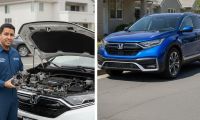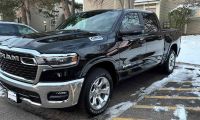Toyota Prius is the best-selling hybrid of all time and has been one of the most reliable and dependable cars on the market for two decades. In short, this is a vehicle owners can trust.
Of course, getting terrific fuel economy does not hurt one bit either. Current 2021 Toyota Prius is rated up to 58mpg in the city, 53mpg on the highway, and 56mpg combined (for the L Eco trim level).
I recently wrote a Torque News story about how long a Toyota hybrid battery generally lasts. This got me thinking more about batteries.
What about the different types of hybrid batteries? Toyota hybrid vehicles typically utilize either a Nickel-Metal Hydride (NiMH) or Lithium-ion (Li-ion) battery.
One or the other.
A 2021 Prius uses both.
Time to analyze.
2021 Toyota Prius
You may recognize 2021 Toyota Prius trim levels, as they are coming from a familiar place. Just like on other popular Toyota models you will see L Eco, LE, XLE and Limited. These are front-wheel drive.

Prius also features all-wheel drive trims as well. They will be labeled as LE AWD-e and XLE AWD-e. Two all-wheel drive trim levels. The “e” stands for electric.
Both all-wheel drive Toyota Prius grades come with a Nickel-Metal Hydride battery. Nickel batteries can withstand harsher temperature changes. Therefore, this hybrid battery choice is ideal for colder climates where snow and ice and frigid temps are more prevalent.
Yes, I am talking to you Michigan and Boston and Denver drivers. I grew up in Michigan and learned to drive there. I wish I had something like Prius AWD-e.
Lithium-ion vs Nickel-Metal Hydride
The more familiar name here is Nickel-Metal Hydride. This hybrid battery has been around the longest. It is dependable and long-lasting.
Then again, so is Lithium-ion. That is the beauty here. Either Toyota hybrid battery type is reliable and trustworthy over time.
VIDEO YOU MAY ENJOY: Our Toyota master diagnostic technician consultant compares Nickel-Metal Hydride vs Lithium-ion batteries.
Lithium-ion is the newer kid on the block. It is smaller and lighter than its NiMH counterpart. Although both can hold and store a similar level of power, the Lithium-ion battery is able to charge and discharge quicker.
A lighter battery like Lithium-ion may be advantageous in a hybrid, as it aids in getting Toyota Prius going easier and faster. Benefit for Li-ion.

One potential pitfall for Lithium-ion battery is that it does not last as long as NiMH in extremely high temperatures. Maybe I am talking about you Arizona. I had to pick a geography that is known for harsh heat. I was not singling you Arizonians out, I promise.
Lithium-ion is the more expensive technology compared against Nickel-Metal Hydride. The good news here is that Lithium-ion is becoming more and more common. Costs for both battery types should decrease over time.
I guess the take home message is that there is a place for both battery types in the Toyota hybrid world. Hopefully, it will give you some peace of mind knowing that both Nickel-Metal Hydride and Lithium-ion are incredibly dependable and will last you a long time.
If not, remember the new Toyota extended hybrid battery warranty that covers your hybrid battery for 10 years or 150,000 miles.
Yes, more and more peace of mind.
Time for your thoughts on Toyota Prius
Do you own a Toyota Hybrid like Prius or RAV4 Hybrid or Camry Hybrid or maybe RAV4 Prime? What is your experience so far? I would love your feedback.
How many miles do you have on your vehicle? What is your gas mileage typically?
I have driven a Toyota Prius AWD-e recently but only for short drives. What do you think of yours and how does it do in the snow and heavy rain?
Thanks for reading everyone. See you next story when I guide you on a video tour of a Toyota hybrid engine.
Follow Jeff Teague on social media:
- My Toyotajeff.com website
- My Torque News / Toyota News column
- YouTube channel - My "Toyotajeff" Toyota reviews
- My Facebook page
- Instagram @toyotajeff1
- My Twitter page
Thank you everyone for following me.
Set Torque News as Preferred Source on Google











Comments
I have a 2008 Prius with 274
Permalink
I have a 2008 Prius with 274,644 miles. The red triangle of death warning light came on last week, and after having the codes read, the original traction battery is finally going bad in 1 module. My dilemma is, should I replace the car? or the battery? There are companies that build replacement batteries either restored, rehabbed, or new, for around the $1500 mark. My thought are about replacing the battery for one more year, then selling, or buy a new one now. Can't decide.
Hard to make this call for
Permalink
In reply to I have a 2008 Prius with 274 by Joe Hertz (not verified)
Hard to make this call for you online without knowing how well maintained the rest of the car is.
The way I look at it, if the rest of the car has been well kept, I'd rehab the battery. Sales tax alone on a new car is probably going to exceed the cost of rebuilding the battery in the Prius. Purely from a $ standpoint, repairing the Prius you have is likely going to be cheaper than buying another car.
If you replace the battery, and get even one more year out of the Prius, you are probably money ahead versus buying something else.
On the other hand, any car at 274k miles is a roll of the dice. You have to decide what your tolerance of risk is versus your tolerance of your wallet being lighter.
I have a 2008 Prius with 274
Permalink
I have a 2008 Prius with 274,644 miles. The red triangle of death warning light came on last week, and after having the codes read, the original traction battery is finally going bad in 1 module. My dilemma is, should I replace the car? or the battery? There are companies that build replacement batteries either restored, rehabbed, or new, for around the $1500 mark. My thought are about replacing the battery for one more year, then selling, or buy a new one now. Can't decide.
Traded in a 2010 Prius for a
Permalink
Traded in a 2010 Prius for a 2021 L ECO model and surprised by much higher mileage than EPA rating, often over 80 on highway and over 60 in suburban local trips. Florida environment. Large improvement over a decade.
I had a 2001 Prius in the
Permalink
I had a 2001 Prius in the nickel metal hydride 200 volt battery would not keep a charge for 2 weeks the car would not start if it was parked for 2 weeks. That rate of self-discharges way out of tolerance I should have got them to replace it under warranty. My neighbors have much newer 2014 Priuses with the additional battery range and they self-discharge (electrical leakage) as well! The self discharge problem and other battery problems can reduce the gas mileage on the Prius quite a bit. If they leave the charger on it all the time the mice like the heat and chew on The wires. Big $$ not covered by warranty.
Bought a 2009 Prius III new
Permalink
Bought a 2009 Prius III new and drove ten years (150K miles). Original traction battery, zero unscheduled maintenance, averaged 52.6 mpg overall. Sold and bought a new 2019 Avalon Hybrid Limited, with the NiMH battery, and am averaging 48.8 overall (goes down a couple mpg in winter due to heater). Hwy cruise at 67 mph gets 48-50 mpg. Toyota has hybrid technology down pat!
2020 Prius prime here already
Permalink
2020 Prius prime here already have 96k on it. Averaged 64mpg but I plug in every nite and drive interstate speeds on average.
2008 Option 2 Prius. Best
Permalink
2008 Option 2 Prius. Best car I've ever owned. I bought new when fuel was at $4.20 a gallon. 4 months later fuel was under $2. Car has 102,000 miles on it. Replace system battery 2 times using Duracel AGM battery. Traction battery may need replacement, getting about 45 mpg. I will need to do normal maintenance on cooling system, new plugs and belt. 3 sets of tires, no brake issues. Toyota did the homework and I'll buy another
Over the years, I've owned 3
Permalink
Over the years, I've owned 3 Prius cars - a 2004, a 2006, and a 2010. Altogether, I logged about 600,000 miles on them. I kept records of every drop of gasoline, and averaged just under 55 MPG overall. While my needs changed with retirement and I no longer own a hybrid (no more commuting, but wanting to pull a boat), I really enjoyed driving them. They had a surprising amount of room, and were very comfortable even for a big guy like me. Also, the most reliable cars I had ever owned. I had to replace the brakes on one, and a little while later, apparently a CV joint boot had been cut (hmmm), so had to replace a front axle. I did not go back to the brake shop! But that is it. A friend of mine would allow his 12 volt battery to discharge too deeply, which drastically shortens their life, so he had to replace it occasionally. I never had a single battery problem.
Wow! This is a wonderful
Permalink
Wow! This is a wonderful video. I am the owner of a 2011 Prius that now has about 190,000 miles on it, and it is time for me to replace the car. So far we have the original large battery, and we haven't yet had any problems with it. Since my wife and I are both retired we use our Prius mostly for long road trips. Otherwise we can easily go for a month or two on a tank of gas. I wish Priuses weren't so difficult to to find and buy these days, since I think they are wonderful cars. Thank you again very much! By the way, we live in the western part of the State of Montana.
I purchased the first release
Permalink
I purchased the first release of the Prius, the one that came in a Corolla body. I ordered it in August 2000, and it arrived in December. The main battery pack died at 201,000 miles and I had it replaced to the tune of $3,000 (including labor). 45,000 miles later, a very expensive part of the hybrid system failed. At this point, it was not fiscally responsible to invest $6000 (including labor) in a 19-year-old car. Sadly, we replaced the 2001 Prius with a 2020 Camry hybrid in July 2020 (six months shy of being able to get antique plates for the Prius). It was a good run for the old girl. Never any unexpected problems, just the usual maintenance. The mpg did decrease with age, starting at about 52 mpg and dropping to 48 mpg by the time of her demise.
BTW, when my husband's Ford truck needed to be replaced, we got a 2013 Prius V. Fabulous car, it's a shame that Toyota discontinued it. A larger heavier vehicle, I was disappointed with its 46 mpg (third version of hybrid system), but it has also been trouble free. The Camery gets 54 mpg, I'm not sure what version of the hybrid system is in that car. And it's too soon to comment on reliability. Purchased during the pandemic, we've only put about 3000 miles per year on the car so far.
Hi, and thanks for the
Permalink
Hi, and thanks for the opportunity to sing the (older) Prius's praises. I live in South Australia, where, like Arizona or southern Italy, it's much more likely to be hot than cold; we rarely get frosts and in the 30 years I've lived here (which is very close to sea level), it's never snowed.
I bought my 2007 Prius second-hand from our State government, where it had been a pool vehicle, but serviced by the dealer roughly on schedule - 6 months or 10,000 kilometres (6,000 miles?). It had 59,000 kms on the odometer.
We'd had it perhaps 3 years and added another 50,000 kms when I felt something kick or bump under my foot from the passenger seat, and a warning light came on - take it to the dealer. Dealer replaced the 12v battery - 100% that'll solve the problem. Then when the warning light came on again, the dealer said replace the high voltage relay wires - something like $1300 Aussie dollars, and we were assured 99% that'd fix the problem. When it happened en route somewhere else, we had to take it to a different dealer, and found a mechanic who went, 'Hmm, they've been going off a checklist.' He spent some ten hours in his spare time going through what might be causing that particular code (including talking with the Toyota Australia people then pushing the problem up to the engineers in Japan), but only charged us for one hour of labor as it was a problem he'd never seen before and it intrigued him. (Because his boss supported him in his investigations, this dealer now has a customer FOR LIFE for this reason.) It turned out to be both the inverter and transaxle needed replacing. And it turned out if we'd kept going back to the original dealer and their checklist, it would have cost us about $30k before they'd stumbled onto the correct combination solution.
So going with the different dealer for life and scheduled maintenance, our 2007 Prius is still ticking along with 260,000 kms on the odometer. It needed a new nickel metal-hydride battery at about 200,000kms, but if we get another 200,000kms out of the second one, that'll work out to a grand cost of 1.5 cents per kilometer in addition to fuel. It's been a while since it went on a long trip, but it usually gets 5.1 litres per 100 kms on longer runs (if my maths is right, that's 47.35mpg).
Not too shabby for a 15 year old vehicle. Well done, Toyota.
Pagination